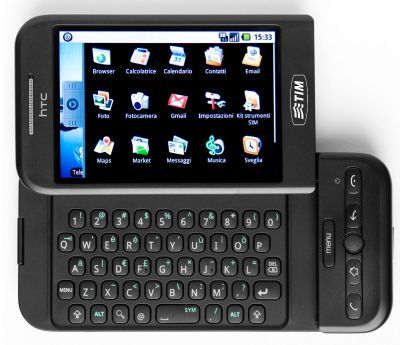A few interesting events took place six years ago. In the USA, the biggest chart-topping song was “Whatever You Like” by T.I., while in the UK people were enjoying Kings of Leon's “Sex On Fire”. The weather was nice as well in September, but probably the most exciting event took place in the city of New York where HTC announced their first smartphone running Android OS. The HTC Dream on T-Mobile was officially presented to public. Today, the G1 is six years old and we would like to wish it a happy sixth birthday!
It all began back in 2005 when Andy Rubin, the CEO of Android Inc., got an astonishing offer from Google, which at the time was most well known for its search engine. Our dear friends from Mountain View were looking to enter the mobile phone market and Rubin's company seemed to be a nice option for them. They made an offer that Rubin et al. accepted, and three years later, on Septemeber 22nd 2008, the first Google phone has been released in an association with T-Mobile. After just six months, the G1 became one of the most popular devices in USA. It landed in fifth place in terms of numbers of devices sold.
At the time, the Android Open Source Project was something new in the mobile world. It was one of the first major open source mobile operating systems. The Android Market, known today as the Google Play Store, also debuted with G1. It had 50 free applications at the time of launch. Google certainly didn't expect such explosive popularity at launch. The OS was the most interesting and fun part of the G1. Users could (and did) contribute to the project making it exactly what we know and love today. Of course, most of the features have been developed by Google employees, but many crucial contributions were developed by users. But let's talk about its roots.
Android wasn't Andy Rubin's first project. The current SVP of mobile and digital content at Google had a pretty successful campaign with the Hiptop smartphone, which was rebranded as the Sidekick by T-Mobile. Some similarities in the overall look and feel can be found between Hiptop and the G1--namely the pop-out keyboard and screen design. HTC's phone was pretty good alternative to the BlackBerry and iPhone 3G, which were the most popular devices back then. As you can see, the war between Apple and Google has started a long time ago. Of course we can still see those two brands stretching their muscles. However, BlackBerry seems to have lost the battle long ago, and once the main contender in the business world has become a small company with just a few devices in its stable.
Back then, a physical keyboard was nothing abnormal. The same could be said for trackballs. Even Android itself had no support for virtual keyboards at the time. Now, it's virtually impossible to find a modern device as chunky as the G1 and featuring a physical keyboard. Maybe they will be popular one day again? A few years back, we wanted our devices to be as small as possible, and now we can buy phones that we must keep in our bags, because our pockets are too small.
With the HTC Dream's release, Google introduced many interesting functions that we know and can't live without. Among them we found multitasking, copy and paste, pull-down notifications and home screen widgets. Gmail and Google Maps had their premiere as well. Back in those days, Google had no music application, so they asked Amazon to provide an application for them.
Google were very responsive to bug reports and addressed some issues shortly. The virtual keyboard support and video recording were quickly added, and the device has also received two big updates, to Cupcake and Donut, which was the final version this phone has received.
The T-Mobile G1 is a very important milestone in Google's history. After a few short years, Android became the most popular mobile operating system in the world with numerous users around the world. Google can now compete with (and reign supreme over) Apple, and they have now established new standards in the mobile world. Companies like HTC and LG decided to commit their future to Android and released multiple great devices, and have since become leaders in the mobile industry (though they are somewhat dwarfed by an 800 lbs. gorilla named Samsung). Needless to say that Samsung is the dominant force in the mobile market thanks to Android and great devices like Samsung Galaxy S and the Samsung Galaxy Nexus.
Today, we are waiting to see another Nexus devices, likely produced by HTC (Nexus 9) and Motorola (Nexus 6 aka Shamu). Will they make Google and Android even stronger like the G1 once did? Or perhaps this platform will slowly die and will be forgotten, only to be replaced by an even better option?
Do you still own your old Dream/G1? How do you like it after so many years? Is it the best or most important Android device (relative to its time) in history or is it just one of many that weren't functional at all and Google just got lucky? Share your opinion in the comment section below.


